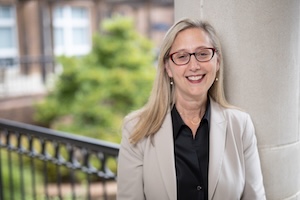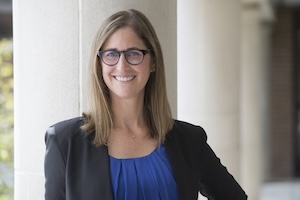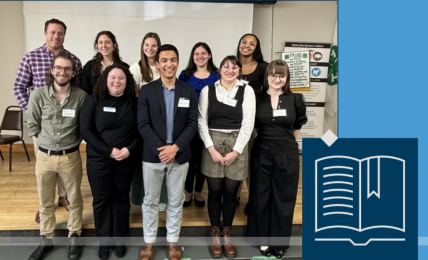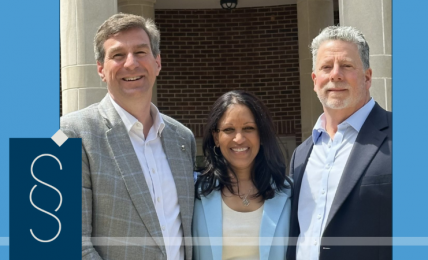Family Defense Clinic
In the Family Defense Clinic, students represent parents in child welfare cases. Students interview and counsel parents who have been accused of abuse or neglect of their children and may have had their children removed from their care. Students conduct investigations, prepare case strategies, draft pleadings and motions, participate in the court system’s Child Planning Conferences, and litigate cases. In their role as parents’ attorneys, students interact with all participants in the child protection system: social workers, county attorneys, Guardians ad Litem, and judges. In addition to representation of parents in abuse and neglect proceedings, where appropriate, students may represent parents in other matters that may assist them in maintaining custody of their children, including, but not limited to, domestic violence and other family law matters.
A conversation with Clinical Professor of Law and Director of the Family Defense Clinic Beth Posner

Q: Why did you start Family Defense Clinic?
A: As a new attorney working for Legal Services of North Carolina, my first client in a domestic violence matter had her children removed by the Department of Social Services. I was shocked at how difficult it was for her to access assistance and achieve reunification with her children. The plight of that first client has stayed in my head, and for the last 28 years of teaching and practicing in domestic violence, I have seen so many of our clients simultaneously engaged in the Department of Social Services court because of issues related to family violence. These clients need quality representation to mitigate generational cycles of violence while keeping their families intact and avoiding the problematic foster care system.
Additionally, the beginning of this new clinic coincides with the State Bar’s, District Court Judges’, and North Carolina Office of Indigent Defense Services’ identification of parent defense representation as a key need and crisis throughout the state. Parents are entitled to representation in these matters, however, the number of attorneys on the court-appointment lists has dwindled, and the pay they receive from the state is so low that few attorneys are able to provide robust and wrap-around representation to clients. The falling numbers on the court-appointed lists have created a legal desert throughout the state, and I hope that this clinic will train students to fill this gap.
Q: How many students will be involved with the clinic, and what will be their responsibilities?
A: Eight students will be in the clinic for the full year.
They will represent parents in child welfare cases in Orange and Chatham Counties. These are cases where the county departments of social services have alleged abuse, neglect, or dependency, and, in most cases, have removed children from the home. Students will represent parents through all stages of the Department of Social Services proceedings: providing advice, counsel, and representation in the initiation of a case by Department of Social Services; assisting clients in accessing services aimed at reunification; representing clients at planning and review hearings; and, when necessary, representing clients in termination of parental rights matters. The primary goal of this representation is maintaining family integrity, and students will also provide advice, counsel, and representation in related matters to assist parents who are being investigated by the Department of Social Services but who may need legal assistance to prevent removal.
Q: What are some of the services the clinic will provide? What skills will students be prepared to use in practice?
A: Students will be lead attorneys in live-client representation of parents who have been accused of abuse or neglect and will participate in complex pre-litigation and litigation in child welfare court. Additionally, through readings, discussions and guest speakers, students will learn the following major topics: (1) the law of child protection in North Carolina; (2) the roles and professional obligations of parent attorneys, county attorneys, social workers, Guardians ad Litem, and the judiciary in these cases; (3) case planning and strategy; (4) holistic and collaborative representation of clients; (5) trauma-informed and culturally aware counseling and litigation; and (6) essential trial skills.
Q: What do you hope students will take away from their experience in the clinic once this semester is complete?
A: Students in this new clinic will learn all the skills our litigation clinics impart: trial skills; best practices in counseling and negotiation; critical thinking, legal analysis, and writing; and empathetic, client-centered representation. My hope is that by teaching students to be parent defenders at the highest level, they will go out into the practice of law and continue to do this work in their law offices, at non-profit agencies, and throughout the state. We desperately need skilled parent defenders and Carolina Law is uniquely positioned to change the landscape here.
Economic Justice Clinic
Students in the Economic Justice Clinic primarily represent low-income individuals in civil litigation, regulatory, and transactional matters related to consumer credit and debt, including on issues related to home ownership and foreclosure, car ownership and repossession, and student debt. Students may also work with organizational partners. For example, in any given semester students may participate in policy projects, provide feedback to state and federal consumer protection agencies, create and disseminate consumer education materials, or participate in complex litigation in support of broader consumer rights and consumer law advocacy efforts.
A conversation with Associate Professor of Law and Director of the Economic Justice Clinic Kate Sablosky Elengold

Q: How is the Economic Justice Clinic impacting the community through student-led initiatives?
A: The Economic Justice Clinic represents individual North Carolinians who have been taken advantage of in the marketplace. We have had clients fighting foreclosure, subject to unfair debt collection practices, stuck in predatory and illegal loans, and fighting default judgments based on wrongly decided underlying cases. The Economic Justice Clinic students, as lead counsel, interview their clients, counsel the clients on legal rights and remedies, take the lead on negotiations with the opposing party, draft and file legal pleadings, and argue in front of the court on behalf of their client. Each semester, the Economic Justice Clinic takes on between six to eight clients. Not only have our students gotten financial relief for their clients, but they are often the only people in the justice system who have really listened to the client, heard their stories, and advocated for their best interests.
Q: Tell me about the new heirs’ property work that is helping African American families protect generational land. How are students working on this initiative, and what exactly are they doing for the clients? How did this come about?
A: Heirs’ property comes from a confluence of multiple legal doctrines that make it hard for families who have had land passed down for generations to keep their land in the family. When someone dies without a will, their heirs inherit the property as co-tenants, which gives each heir the right to use the whole property. As this happens generation over generation, the heirs multiply and their proportional ownership gets smaller and smaller. If any one heir sells their proportional ownership, that can leave the rest of the family vulnerable to losing the land, by a legal doctrine called partition, to someone outside the family. Farming families in North Carolina, primarily African Americans and mostly in rural areas, have been hard hit by this process and have lost land that had been in the family for generations.
I teach about heirs’ property in my first-year law student property class, which piqued my interest. And I often get clinic students who were in my property class, so they already know the basics. I have created relationships with non-profits doing heirs’ property work, including the Land Loss Prevention Project. In fact, I connected with them through a Carolina Law alum! Through the Land Loss Prevention Project, the clinic took its first two heirs’ property cases, helping families consolidate their land holdings so that they can better control the use and future of their family land. The students interviewed and counseled the clients, did legal research, and then prepared deeds to consolidate the properties. The work is fulfilling, and it teaches transactional skills that many of my students will use in the future.
Q: I understand that students are successfully defending clients against unjust debt collection practices. Can you tell me more about that? What exactly are these unjust debt collection practices? How did they begin, and how do people get caught up in them? What are students learning from these experiences?
A: There are federal and state laws that govern how a debt collector can go about collecting on the debt. They arose because studies showed that debt collectors were engaged in abusive practices, including harassing debtors, misrepresenting information to debtors, and threatening criminal sanctions and jail time for nonpayment, which is a remedy the U.S. Supreme Court has declared unconstitutional.
The clinic has represented clients where a debt collection violation has arisen alongside other unfair and deceptive practices. We also have represented clients where debt collectors have attempted collection on debt that the client did not owe. The clinic has recovered money for clients through both settlements and court orders.
Like all of our work, the students learn so much in debt collection cases. They see the mechanisms of the debt collection and debt buying industry in real life. Debt collection is the number one kind of case filling the state court dockets and millions of Americans are caught up in these cases. The students also learn lawyering skills that are useful for any area of law they eventually practice. They interview the client, parse all of that information, and do significant legal research to see if the client has any legal remedies, counsel the client on those legal options and any non-legal avenues that they identify, and then turn the client’s story into a digestible and clear legal narrative for the opposing party and the court.
Q: One of your teams is winning consumer protection cases, resulting in full refunds plus damages for auto sales fraud victims. How are they winning these cases, and how is this impacting the clients? How is it impacting the students who are working with these clients?
A: Economic Justice Clinic students have won many cases. Last year, the students had a client who had purchased a car, based on promises that it was in good condition, that ultimately did not work. The students not only interviewed and counseled the client, but worked with her to develop her case by, for example, asking an independent mechanic to evaluate the car. After failed negotiations with opposing counsel, the students drafted and filed a complex complaint that asserted unfair and deceptive practice and debt collection violations. This was particularly difficult because of the defendant’s corporate form. Therefore, the complaint alleged successor liability and sought to pierce the corporate veil. These are concepts that law students learn in business associations class and they got to put them into practice. Once the students filed the complaint, the defendants decided to settle the case, taking back the car and paying the client money damages. The students developed critical lawyering skills and were able to help a North Carolinian get the relief she deserved.
Q: By the end of this semester, what are you hoping students take away from their work in your clinic?
A: By the time the students finish the clinic, they will have learned the doctrines related to consumer protection. Perhaps even more importantly, they will have developed lawyering skills that translate to all kinds of law practices. Research shows that adults learn best by doing, and that is the core of clinical pedagogy. Students learn skills like interviewing, counseling, negotiation, legal research, written advocacy, and oral advocacy. Students regularly comment on how clinics allow them to connect the dots of the legal doctrines they have learned in class and see how they apply them in the real world. Plus, they get to be a small part of plugging the access to justice gap in North Carolina.
Institute for Innovation/Outer Banks Entrepreneurs Partnership
Students in the Intellectual Property Clinic assist entrepreneurs, small businesses, and startups with the protection, acquisition, and management of intellectual property rights. In addition to their direct client representation, all students will have the opportunity to become certified by the U.S. Patent and Trademark Office, which provides students with limited recognition to practice before the U.S. Patent and Trademark Office under the supervision of the clinic faculty supervisor.
Outer Banks Entrepreneurs is a vibrant hub of women’s empowerment, connection, and success. Based in the scenic Outer Banks of North Carolina, with additional chapters in Elizabeth City, North Carolina, and Chesapeake, Virginia, they are a thriving community of female artists, business professionals, crafters, direct sellers, non-profit organizations, and service providers.
A conversation with Associate Professor of Law and Director of the Intellectual Property Clinic Dustin Marlan

Q: How did this partnership with Outer Banks Entrepreneurs come about?
A: Outer Banks Entrepreneurs are doing outstanding work in a region of the state that has not historically been recognized as a hub for entrepreneurship. Our Institute for Innovation Executive Director Aaron Gard connected with Kim Twiddy, president and founder of Outer Banks Entrepreneurs, and since then, the partnership has flourished. Many of our students have worked with clients from the Outer Banks, and we have hosted multiple workshops at their incubator to help local businesses grow and thrive.
Q: I understand that some of your students are assisting clients with patent and trademark work. Can you explain in more detail what your students are doing and what the impact is on your clients?
A: We are a U.S. Patent and Trademark Office (USPTO) Certified Trademark Clinic. This certification allows our students to file trademark documents directly with the U.S. Patent and Trademark Office and benefit from expedited review. As a result, our clients can secure trademark protection more quickly, and our students have the chance to see a matter through multiple stages during their semester in the clinic. For example, a student might file an initial trademark application and later respond to an examiner’s questions or objections, all within the same term.
Q: If your students could use one word to describe their experience working in your clinics, what would that one word be?
A. You would have to ask them, but I have heard “fortunate” mentioned more than a few times. They are very grateful to have the opportunity to engage in real-world intellectual property practice for clients who are doing great things for their communities.
Q: What is the goal of this partnership, and what do you hope the outcome will be for students and for your clients?
A: Our goal is twofold. We want to expand access to high-quality legal services for entrepreneurs across North Carolina — particularly in regions where such resources are scarce — and to provide our students with hands-on experience in transactional lawyering and client engagement. It’s a mutually beneficial model. Our clients gain valuable legal guidance that can help their ventures succeed, and our students develop the practical skills, confidence, and professional judgment they’ll carry into their careers.


